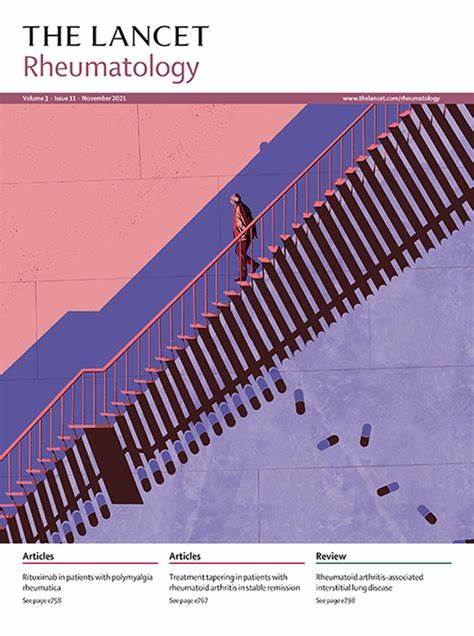在健康志愿者和类风湿性关节炎患者中评估鞘氨醇-1-磷酸受体-1 的选择性激动剂 proximod:1 期双盲、随机、安慰剂对照、剂量递增试验。
IF 15
1区 医学
Q1 RHEUMATOLOGY
引用次数: 0
摘要
背景Proximod 是鞘氨醇-1-磷酸受体-1(S1PR1)的选择性激动剂。它通过将循环中的淋巴细胞重新导向次级淋巴结而发挥作用,目前正被开发为治疗类风湿性关节炎的免疫调节剂。我们旨在评估 proximod 在健康志愿者和类风湿关节炎患者中的安全性、药代动力学和初步疗效:我们在中国的一个中心进行了一项分为两部分、第一阶段、双盲、随机、安慰剂对照、剂量递增的试验。符合条件的健康志愿者为年龄在 18-50 岁、体重指数在 18-28 kg/m2 的成年人,类风湿关节炎患者为年龄在 18-70 岁、体重指数在 18-30 kg/m2 的成年人。在第 1 部分中,健康志愿者被随机分配到 10 个队列中,接受单次口服剂量的 proximod(在第 1-10 队列中分别为 0-125 毫克、0-25 毫克、0-5 毫克、1 毫克、1-5 毫克、2 毫克、3 毫克、5 毫克、10 毫克或 15 毫克)或安慰剂。在第二部分中,健康志愿者被随机分配接受每日一次剂量的proximod 5毫克或安慰剂,类风湿关节炎患者被随机分配接受每日一次剂量的proximod 5毫克、proximod 10毫克或安慰剂,共28天。患者和研究人员对治疗分配均蒙面。主要结果是对所有接受治疗的参与者评估proximod在健康志愿者体内72天和类风湿关节炎患者体内48天的安全性、耐受性和药代动力学特征。该试验已在ClinicalTrials.gov(NCT06361199、NCT06361186)注册,并已完成。研究结果:2017年11月1日至2021年6月22日期间,124名健康志愿者被随机分配到研究的第一部分,124人被纳入分析(平均年龄34-3岁[SD 6-9],124名参与者中有62名[50%]为女性,62名[50%]为男性,116名[94%]为汉族)。在 2022 年 2 月 16 日至 2023 年 10 月 8 日期间,共筛选出 113 名参与者(80 名健康志愿者和 33 名类风湿性关节炎患者)纳入第 2 部分。79名参与者被排除,34名参与者被随机分配(10名健康参与者和24名类风湿性关节炎患者),其中34人被纳入分析。10 名健康参与者中有 10 人(100%)为汉族,平均年龄为 39-9 岁(SD 7-3)。10 名健康志愿者中有 5 名(50%)为女性,5 名(50%)为男性。)在 24 名类风湿性关节炎患者中,22 人(92%)为汉族,平均年龄为 52-7 岁(标准差为 6-8)。24 名类风湿性关节炎患者中,22 名(92%)为女性,2 名(8%)为男性。在第一部分中,所有剂量的普罗西莫德耐受性良好,未观察到与剂量相关的不良反应或严重不良事件。在第二部分中,10名健康志愿者中有8名(80%)和24名类风湿性关节炎患者中有22名(92%)报告了74例不良反应。与 Proximod 相关的不良反应主要为轻度或中度。在第 2 部分中,接受普罗西莫德治疗的三组患者体内普罗西莫德及其活性代谢物磷酸普罗西莫德的浓度均逐渐升高,5 毫克组和 10 毫克组在第 14 天达到 S1PR1 激动剂对磷酸普罗西莫德的 EC50 值(6-1 毫微克/毫升),10 毫克组在第 7 天达到 EC50 值。在健康志愿者和类风湿性关节炎患者中,5 毫克组在第 28 天对磷酸丙西莫德的平均 Ctrough 值分别为 7-7 纳克/毫升和 10-2 纳克/毫升;在类风湿性关节炎患者中,10 毫克组的平均 Ctrough 值为 15-3 纳克/毫升。在类风湿性关节炎患者中,所有 Proximod 组的淋巴细胞计数在治疗后都有所下降,大约在第 28 天降至最低点,5 毫克组从基线下降的百分比为 65-25%,10 毫克组为 71-64%,安慰剂组为 20-57%:Proximod在28天的治疗期间表现出良好的耐受性,证明了其在降低血液淋巴细胞计数方面的潜力。这些结果凸显了 S1PR1 激动剂 Proximod 作为类风湿关节炎治疗潜在候选药物的前景,值得在后续临床研究中进一步探讨:北京联合制药厂和健宽(苏州)生物技术有限公司。本文章由计算机程序翻译,如有差异,请以英文原文为准。
Evaluation of proximod, a selective agonist of sphingosine-1-phosphate receptor-1, in healthy volunteers and patients with rheumatoid arthritis: a phase 1, double-blind, randomised, placebo-controlled, ascending dose trial
Background
Proximod is a selective agonist of sphingosine-1-phosphate receptor-1 (S1PR1). It acts by redirecting lymphocytes from the circulation to secondary lymph nodes, and is under development as an immunomodulator for rheumatoid arthritis. We aimed to evaluate the safety, pharmacokinetics, and preliminary efficacy of proximod in healthy volunteers and patients with rheumatoid arthritis.
Methods
We did a two part, phase 1, double-blind, randomised, placebo-controlled, ascending dose trial at a single centre in China. Eligible participants were adults aged 18–50 years with a BMI of 18–28 kg/m2 for healthy volunteers and aged 18–70 years with a BMI of 18–30 kg/m2 for patients with rheumatoid arthritis. In part 1, healthy volunteers were randomly assigned within ten cohorts to receive a single oral dose of proximod (0·125 mg, 0·25 mg, 0·5 mg, 1 mg, 1·5 mg, 2 mg, 3 mg, 5 mg, 10 mg, or 15 mg in cohorts 1–10) or placebo. In part 2, healthy volunteers were randomly assigned to receive once-daily doses of proximod 5 mg or placebo, and patients with rheumatoid arthritis were randomly assigned to receive once-daily doses of proximod 5 mg, proximod 10 mg, or placebo, for 28 days. Patients and investigators were masked to treatment assignment. The primary outcomes were safety, tolerability, and pharmacokinetic profile of proximod for 72 days in healthy volunteers and for 48 days in patients with rhematoid arthritis, assessed in all treated participants. This trial is registered with ClinicalTrials.gov (NCT06361199, NCT06361186), and is complete.
Findings
Between Nov 1, 2017, and June 22, 2021, 124 healthy volunteers were randomly assigned in part 1 of the study and 124 were included in the analyses (mean age 34·3 years [SD 6·9], 62 [50%] of 124 participants were women and 62 [50%] were men, and 116 [94%] were Han Chinese ethnicity). Between Feb 16, 2022, and Oct 8, 2023, 113 participants were screened for inclusion in part 2 (80 healthy volunteers and 33 patients with rheumatoid arthritis). 79 participants were excluded and 34 were randomly assigned (10 healthy participants and 24 patients with rheumatoid arthritis), 34 of whom were included in the analyses. Ten (100%) of ten healthy participants were Han Chinese ethnicity, with a mean age of 39·9 years (SD 7·3). Five (50%) of ten healthy volunteers were women and five (50%) were men). 22 (92%) of 24 participants with rheumatoid arthritis were Han Chinese ethnicity, with a mean age of 52·7 years (SD 6·8). 22 (92%) of 24 patients with rheumatoid arthritis were women and two (8%) were men. In part 1, all doses of proximod were well tolerated, with no dose-related adverse reactions or serious adverse events observed. In part 2, 74 adverse reactions were reported in eight (80%) of ten healthy volunteers and 22 (92%) of 24 patients with rheumatoid arthritis. Adverse events associated with proximod were predominantly mild or moderate. In part 2, the concentration of proximod and its active metabolite, proximod-phosphate, gradually increased in all three groups receiving proximod and the EC50 of the S1PR1 agonist for proximod-phosphate (6·1 ng/mL) was reached on day 14 for both 5 mg groups, and on day 7 for the 10 mg group. The mean Ctrough values for proximod-phosphate on day 28 were 7·7 ng/mL and 10·2 ng/mL for 5 mg in healthy volunteers and patients with rheumatoid arthritis, respectively, and 15·3 ng/mL for 10 mg in patients with rheumatoid arthritis. In patients with rheumatoid arthritis, lymphocyte count decreased after treatment in all proximod groups reaching nadir at approximately day 28, with a corresponding percentage decline from baseline of 65·25% in the 5 mg group, 71·64% in the 10 mg group, and 20·57% in the placebo group.
Interpretation
Proximod exhibited good tolerability over the 28-day treatment period, demonstrating its potential in reducing blood lymphocyte count. These results highlight the promise of the S1PR1 agonist proximod as a potential candidate for rheumatoid arthritis treatment, warranting further investigation in subsequent clinical studies.
Funding
Beijing Union Pharmaceutical Factory and Jian Kuan (Suzhou) Biotechnology.
求助全文
通过发布文献求助,成功后即可免费获取论文全文。
去求助
来源期刊

Lancet Rheumatology
RHEUMATOLOGY-
CiteScore
34.70
自引率
3.10%
发文量
279
期刊介绍:
The Lancet Rheumatology, an independent journal, is dedicated to publishing content relevant to rheumatology specialists worldwide. It focuses on studies that advance clinical practice, challenge existing norms, and advocate for changes in health policy. The journal covers clinical research, particularly clinical trials, expert reviews, and thought-provoking commentary on the diagnosis, classification, management, and prevention of rheumatic diseases, including arthritis, musculoskeletal disorders, connective tissue diseases, and immune system disorders. Additionally, it publishes high-quality translational studies supported by robust clinical data, prioritizing those that identify potential new therapeutic targets, advance precision medicine efforts, or directly contribute to future clinical trials.
With its strong clinical orientation, The Lancet Rheumatology serves as an independent voice for the rheumatology community, advocating strongly for the enhancement of patients' lives affected by rheumatic diseases worldwide.
 求助内容:
求助内容: 应助结果提醒方式:
应助结果提醒方式:


